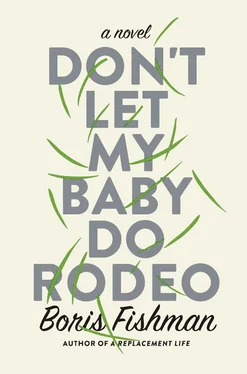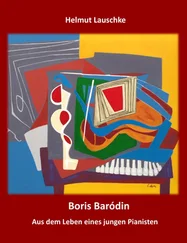From the blue queuing stripe of the bus platform, Maya looked back at her husband. Alex watched from the Corolla, as if she were leaving on a long trip for which she alone was eligible. You could come with me, her eyes said, but Alex remained. He did not see the sense in it; she would be asking him to betray himself.
Inside, her ticket extended to the driver, Maya surveyed the bleak collection of passengers. The 748 ran west from New York City into New Jersey and then north to the New York State line before retracing the route back to the city, a round-trip of three hours. Maya had never gone this way, only from Acrewood east toward New York. On weekends, the less mongoloid of the local Italians forced their bulges inside pleated slacks and went in for the theater matinees, each pair of bus seats a microzone of perfume and cologne. (Maya once had the transgressive thought that she could take up a lover in the city and have all the misted-up Joes and Franks on the bus to explain the hint of cologne on her skin.)
Acrewood was on the outer edge of the city’s commuter ring; by now in its evening route west, the bus was nearly empty. The few visible faces were of unfamiliar ethnicity and peered at Maya with sleepy, malicious indifference. She was overcome by the rashness of her action, Raisa’s prejudice against the darkness and her husband’s dissent settling badly in her stomach. She would have been glad to see the Italians now, but at this hour the bus lines belonged to other kinds of riders. She felt the fright in her toes — they flexed inside the sweaty box of her flats — and she looked back at the driver imploringly.
“Will you give me the ticket?” he said. His fingers, in a driver’s glove cut off at the knuckles, were on one end of it, hers on the other. She brought up an embarrassed smile and let go. There was something wrong with his other hand, tucked in his lap like a dead bird. Only one finger was a proper finger, the rest cauterized stumps. She wondered if this made him a reliable driver in the nighttime.
“This won’t hurt a bit,” he said into his ash-colored beard. It was neatly trimmed but had an old-fashioned style, a narrow strip down the jaws. He nodded toward the darkened seats, two weak lines of blue light illuminating the floor. “The drinks cart will be down in a moment. And then our award-winning cuisine.”
The weekend buses between Acrewood and New York that Maya took to wander through the city had two kinds of drivers: For the first, transporting passengers between the greatest city on earth and its suburbs was an imposition on talents the driver was now unable to direct toward other endeavors. This sank the driver into a scowling depression; he — often she — declined to announce the stops, apologize for delays, engage the riders.
For the second type of driver, the cruise ship of the bus was on brief furlough from the debased preoccupations of the stationary world. It was time to fly. “Welcome on my bus, ladies and gentlemen,” this type of driver said. “I want you to buckle up. I want you to keep your food in your purses and backpacks. I want you to close your eyes.” Maya always listened. She closed her eyes and let the sun hit her eyelids through the wide square windows. “What’s my name?” the driver said. “Who looked at my name tag? I will give the cost of the ticket back to the winner.” Half a dozen shouts raced up the aisles, all wrong. “I want you to notice things, ladies and gentlemen,” the driver said. “Open your eyes now. What do you see?” Now nearly everyone shouted, though Maya was too shy: They saw the guy seated in front of them; they saw the Acrewood Park & Ride; they saw the future (always one smart-ass per bus). By then, the bus had touched off for New York City, and over the alternating rev and sigh of the engine and brakes, the driver, if Hispanic or Caribbean, told them how he had come to America (if he agreed to serve in Vietnam, he would be granted citizenship and allowed to bring his family over); and they listened respectfully. He told them about the wedding he had once had on his bus — the bride and groom had met on it (they asked him to chauffeur them on their honeymoon through the national parks, but the romantic imagination of the New Jersey state bus line ended here); and they laughed. He asked them which town near Acrewood George Washington had temporarily used as his headquarters; and they shouted guesses. “I don’t want to tire you out, so last question,” the driver would say. “Do you realize the brakes haven’t been working since Clifton?” The passengers arrived at Port Authority slightly aroused, a sweat up on their spirits.
Invariably, somewhere around the Turnpike exit, the smart-ass would shout up, good-naturedly, How about you quit yakking and drive the goddamn bus? What this imbecile failed to understand was that he felt invited to make this stupid remark — and was rewarded with laughs — not because he was clever, but because his neighbors felt free to communicate with one another thanks to the yakking started up by the driver. The driver yakked, so they spoke. Creativity where none was required, generosity where none was required: The driver was advance notice of what you could expect on the streets of the city. As the skyline came into view, Maya’s brain bristled with all the things she would say if she had to pilot the bus toward New York. And when the driver batted the imbecile away humorously—“If I stop yakking at my passengers, it’ll be left for my wife, and she made her feelings on that clear a long time ago”—Maya swelled with satisfaction and pride. And then she wondered if the driver was telling the truth.
Frank Sarachillo — on entering the bus, Maya now always looked at the driver’s name tag — was clearly this second type of driver, and Maya tried to shelter from the uneasy atmosphere of the bus in this fact. But tonight, she was a different kind of rider. As the bus abandoned familiar territory — for some reason, Maya couldn’t imagine Max in any of the neighboring towns; he was farther; she felt it — Maya exercised the full extent of a passenger’s privileges, yanking the yellow cord every time Frank announced a stop. When the bus came to a halt, she scrambled toward the tinted windows, startling the sleepers in her way, and searched for her son amid the wan light of the bus shelters, in whose depressing glare she was almost grateful not to discover him. The bus always drove off too quickly. In Ringwood, however, it remained by the shelter even after she had gotten a clear eyeful.
“Would the passenger who wants to get off everywhere come up to the front?” Frank said into his microphone.
“What gives, lady?” Frank said after Maya had shuffled up to the front, sleeping faces stirring resentfully. His face asked if his impression at the nice moment they’d shared at the beginning had to be revised because actually she was a lunatic.
“I’m sorry,” she said, stone-faced. “There’s. . it’s. .” She felt tears start.
Frank’s eyebrows, of the same gray bristly mix as his beard, slunk together. “All right, now,” he said. “Take it easy.” The night shift regularly put him in acquaintance with the glitches and flaws of human design, but Maya didn’t seem crazy, only despondent. She nodded vacantly, grateful not to be dismissed so far from home, and turned back to her seat.
“Don’t pull the cord anymore,” he called to her. “I’ll slow down at the stops. I’m supposed to, anyway.” Maya nodded mirthlessly. At home, riding the bus had seemed zealous in the right way. Was her poor judgment a temporary function of her worry and grief, or were the worry and grief disclosing something about her true nature otherwise concealed by generally benign circumstances? She didn’t know how to answer, did not want to.
Читать дальше












